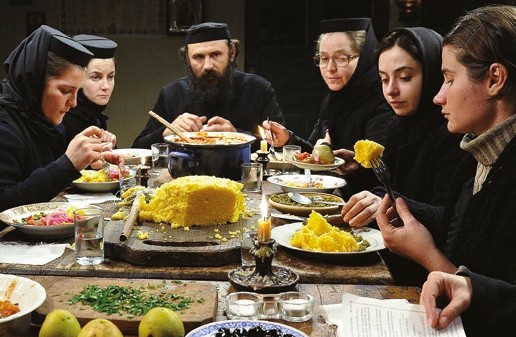Romanian film at Cannes: Cristian Mungiu's 'Beyond the Hills'
 Romanian director Crisitian Mungiu is no stranger to the Cannes film festival. His first feature film 'Occident' premiered in the festival's Director's Fortnight in 2002. Five years later he was back with his second feature '4 months, 3 weeks and 2 days,' which won him the the prestigious Palme D'Or. Now, with După Dealuri (Beyond the Hills), his third feature as writer and director, he is in the Cannes official selection again.
Romanian director Crisitian Mungiu is no stranger to the Cannes film festival. His first feature film 'Occident' premiered in the festival's Director's Fortnight in 2002. Five years later he was back with his second feature '4 months, 3 weeks and 2 days,' which won him the the prestigious Palme D'Or. Now, with După Dealuri (Beyond the Hills), his third feature as writer and director, he is in the Cannes official selection again.
După Dealuri is a thoroughly Romanian affair. The cast and crew, the production and the story itself are all local. The film deals with two powerful themes in the Romanian psyche – the Orthodox Church and emigration but, says the director, it “is for me primarily a film about love and free will: mostly about how love can turn the concepts of good and evil into very relative ones.”
Set in Romania's North Eastern region of Moldavia, the film tells the story of two girls reunited after one returns home from Germany. Alina has come back to Romania to rekindle her relationship with her childhood friend Voichița, but while she has been away, Voichița has found God and joined the local monastery as a novice. Capturing rural Romania and its people was important for Crisitian Mungiu, “I needed actors who could give the impression that they’re simple people, not well educated, from the countryside and, in the main, very religious.” People from the region where the film is set have a distinctive accent, and the director worked hard to establish a sense of veracity in the characters and setting.
The film was made very quickly, in the space of just a few months over the winter, but its genesis goes back several years to the real, tragic story of a young woman who died after visiting a monastery and undergoing an exorcism. Although the case and the books written on it by author and journalist Tatiana Niculescu Bran provided the starting point for the story, Mungiu intentionally made a fictional film, inspired by, rather than documenting the real events. “My final screenplay is not about what happened in that monastery; it’s not about that priest and about those nuns. It’s fictional and I made a point of moving as far from the original story as I could,” he said.
The director is keen to provoke discussion via the film, saying he hopes “that many regular churchgoers will watch the film and form an opinion after watching it with their own eyes and thinking about it with their own minds - in a way, this is what the film is about: this need.”
Both the lead actresses are making their feature film debuts in the film, Cosmina Stratan, who plays Voichița, worked previously as a TV reporter, while Christina Flutur, in the role of Alina, despite being new to film, has extensive experience acting in the theater. The pivotal part of the priest is played by an old associate of Mungiu, Valeriu Andriuță. And yes, the beard is real! Mungiu explained that Valeriu Andriuță had appeared in all the films he'd made when a student and the director had the actor in mind even before he'd finished writing the screenplay. “I called him long before I decided to make the film and asked him if he could let his beard grow. The more months that passed and the more his beard grew, the more I knew I would have to work with him.” Mungiu says after hearing him read a few lines for the part, he knew he'd made the right choice and didn't bother to audition anyone else for the role.
Beyond the hills takes on a challenging and contentious subject, questioning religion always provokes strong feeling and even during the shooting of the film, the religious differences between those involved was at times an issue, according to Mungiu.
He believes the film will be judged and understood very differently outside Romania to within, and I can see his point. Even though I have spent a reasonable amount of time in Romania, I don't have the personal connection with the places, people and particularly the religion found in the film. Still, the connection we have to our place and community of origin and the profound effect it has on shaping our lives are universal themes that everyone can understand. “Deep down, I hope, Beyond the Hills speaks about options and choices in life deriving from education or from the lack of education, and about how many things in life derive from things that you cannot influence, or of which you are not guilty: where you were brought into the world, by whom, and in the middle of which community,” says the writer and director Cristian Mungiu.
Beyond the Hills is in the Cannes Official Selection, competing against 21 other films for the Palme D'Or. The results will be announced on May 27 and this year's contenders include Wes Anderson's latest film Moonrise Kingdom and a film version of the Jack Kerouac book 'On The Road,' as well as entries from veteran directors Michael Haneke and David Cronenberg.
Liam Lever, liam@romania-insider.com
(photo source- www.festival-cannes.fr)












